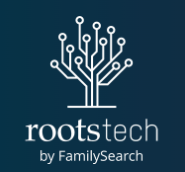
Any links will take you directly to a recommended website.
My playlist is ready and I have now started checking out some sessions, series and keynotes. Some are of interest to me personally and others might be helpful information for those people I help at the local library doing their family history.
UK Ancestors on a budget by Karen Evans
Three sessions – first one about census
- Irish census 1901 and 1911 can be found at the National Archives of Ireland.
- English and Welsh returns for 1841-1911 found at Family Search. Scroll down the page to specify which collection you want to check by typing in England census then choose from the options.
- England, Wales and Scotland records transcribed by volunteers at FreeCen. Note not all places have been transcribed.
Second session – BMD
Civil registration was different for each country.
- England 1837 but compulsory only from 1875
- Ireland from 1864 but non Catholic marriages from 1845
- Scotland from 1855
Places to find civil and church records:
- ScotlandsPeople – search for free but pay for documents at reasonable price – incudes both civil and church records
- IrishGenealogy – has both civil records and church records
- General Register Office – has index for BMD and you can order certificates here more cheaply than from a large database like Ancestry
- FreeBMD – shows indexes for BMD – all volunteers
- UKBMD – again a volunteer based group which shows parishes or counties looking at BMD in their area specifically. Also includes lists of counties with Online Parish Clerk websites (OPC). Also has one place studies and census info – so great site for lots of free information and indexes to use.
- National Library Ireland – Catholic parish registers
- Family search – lots of registers for particular counties and parishes. Find them through Records and narrow further with Collections
- FreeReg – similar to FreeBMD and FreeCen – run by volunteers
Third session – hidden treasures
After having looked at the censuses and BMDs, where else can you look for information while on a budget?
- Find a grave – often includes images, basic info on the person being searched and maybe family info as well
- Commonwealth War Grave Commission (CWGC) – for those who have died in war – variety of ways to search
- County councils – some councils have their own archives of things like dog licences, canal boats, gaols
- GENUKI – great site, breaks down to country then county and parish and what records are available at each level
- Cyndi’s list – world wide links to thousands of websites
- Also check out specials and free trials of the big databases. Often family history societies and local libraries have more resources as well.
- Help online from rootschat, facebook groups and other social media.
Latest DNA Painter releases by Jonny Perl
I love using some of the tools on DNA Painter especially What are the odds (WATO) and the shared cM page. But I have also tried to paint chromosome maps but have found it very tedious adding in one person at a time. But there are now ways to import more than one persons DNA chromosome segments which I might have to start using.
I also learnt about using phased kits at GEDmatch to import just my mum’s data or just my dad’s data. This makes it easier to work out if segments are maternal or paternal on the chromosome map when importing from GEDmatch cluster groups. (Tier 1)
Another new tool was looking at adding dimensions such as birth/death year on your family tree instead of just names. Also colour coding on family trees as well as on WATO.
Main stage events
Many of these sessions are very early in the morning in Australia so I will have to watch them at another time once the recordings are up on the website. But I did listen to Maysoon Zayid and Matthew Modine talking about their family history and how memories make connections through oral history as well as movies and photos.
I did look at some other sessions but will not be writing about them all.
I am disappointed though that I only have 13 relatives at RootsTech – maybe my relatives are not into family history as much as I am.
Readers: What were your takeaways from day 1 at RootsTech?